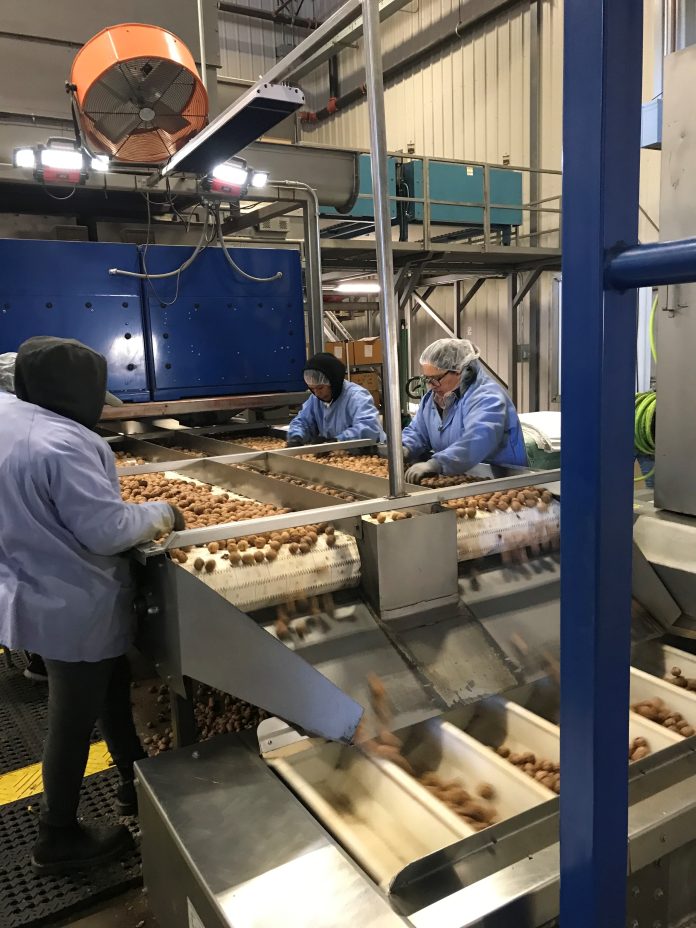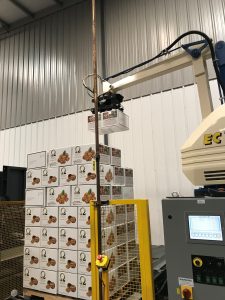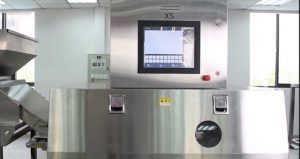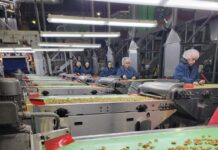
While Omega Walnut is celebrating 10 years of successful production and many accomplishments, this Orland, Calif.-based walnut processor is also dealing with current market and nut quality challenges.
Omega Walnut Grower Relations Manager Gerard Millen and CEO Jeff Sleeper shared their views on walnut industry issues and how this processor strives to meet customer quality expectations.
The facility processes and ships in-shell and shelled walnut products both domestically and internationally.
“Our biggest challenge is trying to generate the best returns for our growers. Our facility was built to accomplish that goal and to grow and meet growers’ needs,” Millen said. “We are committed to producing the highest-quality products possible using today’s technology.”
Omega Walnut is SQF (Safe Quality Food) certified with an excellent rating. Millen explained that means a food safety and quality assurance auditor comes to the plant annually to inspect and “make sure Omega Walnut does what it says it does.” These audits can take three to five days.
“They want to see proof that we are following all food safety requirements,” Millen said.
The plant continues to achieve the high ranking in food quality, Millen said, through preparation to meet quality expectations which can evolve. Omega Walnut is proactive in training to keep up with changing buyer needs and expectations.
In addition to the food safety and quality certifications, Omega is also Halal and Kosher certified and registered with the FDA. The plant uses USDA grading criteria to inspect in-shell products. Grading standards include size, external defects, internal defects and color. Their in-shell nuts are packaged in sacks and sold to both domestic and overseas markets.
Sleeper said Omega Walnut also makes a range of specific products for the shelled market. All kernel sizes and color meet specifications for intended use in domestic and international markets. The shelling operation mechanically cracks the walnuts, and the kernels are separated from shells. Kernels are screened for size, and electronic color sorters are used to deliver a uniform product. Nuts are also physically inspected for any defects. Depending on the end use of the product (e.g., bakery or confection) Omega Walnut supplies products with the goal of exceeding their customers’ expectations for quality.

When a load of hulled walnuts arrives at the plant, trucks and trailers are weighed to obtain a gross weight. While the nuts are being unloaded and put in silos, a sample is taken and used to grade the load. Unloaded trailers are weighed to obtain a growers’ net weight. Millen said the collection is then graded, and information on weight and grading is sent to the grower.
Standards for incoming product grading include moisture levels, insect damage, edible meat yield and color, etc. A product is graded upon delivery with grower returns based on incoming quality.
Millen said 2022 was a very tough year for walnut quality as high temperatures in September caused quality defects including sunburn/dark kernels and shriveled kernels.
“Due to drought, there was no deep moisture in the ground, and with 7 to 10 days of temps in the 115- to 117-degree-F range right during a critical time in nut development, that created a problem for us with quality,” Millen said. “Normally, the heat comes earlier and has less effect on nut development.”

Millen said good equipment and technologies are key to increasing the value of their products and meeting buyers’ high-quality expectations.
Sorting Machines Provide Flexibility
“The use of deep artificial intelligence in sorting is helping nut processors retain value by increasing their end product quality,” said Oscar Sandoval with AMVT LLC. These sorters are able to be ‘trained’ to detect more color differences and help more of the product to retain its highest possible value.
“The sorters are able to separate out lighter kernels so there won’t be a need to dice and sell at a lower price.” With deep artificial intelligence and shape recognition ability, sorters can also separate out perfect kernels from those with imperfections like a broken shoulder or missing quarter. Sandoval explained that the deep AI works by inputting pictures of different varieties and shapes. It learns and then picks out kernels that match those pictures from the product flow.
Because of the product flexibility AI sorting allows, there has been an increase in interest from processors who need to increase the value to their walnut products.
Another added benefit of deep AI sorters is that can replace hand sorting, allowing the tree nut industry to compete with other industries where hand sorting is used at a much lower cost. The AI sorting process is much more efficient and quicker with a throughput from 3,000 lbs./hr. up to 8,000 lbs./hr. compared to the hand sorting process with a throughput of approximately 2,200 lbs./hr. or one bin per hour.
Targeting foreign material among nuts is also crucial. Traditional sorters or hand sorting tend to have a greater loss of good product from the removal process compared to deep AI which focuses on the foreign material reducing the amount of collateral.
Sandoval says that AMVT LLC has two types of sorters: belt sorters and x-ray sorters. The advantage of x-ray is that it sorts by density which helps by removing rocks that otherwise may not be able to be sorted by coloration due to being closely similar to walnut meats.











